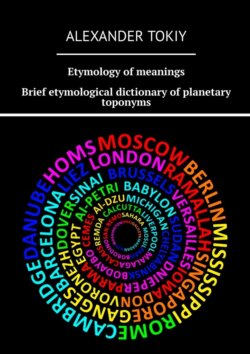Etymology of meanings. Brief etymological dictionary of planetary toponyms. At the origins of civilization

Реклама. ООО «ЛитРес», ИНН: 7719571260.
Оглавление
Alexander Tokiy. Etymology of meanings. Brief etymological dictionary of planetary toponyms. At the origins of civilization
Foreword
To the Descendants of Sisyphus (instead of a Preface)
The soft sound “l’” or where does a hobby start?
Feelings, sounds and protoroots
“Unnecessary knowledge” or two words about entropy
Get to the truth
Ancient prepositions
Water is a life! Protoroots in the ancient names of water bodies
Between two rivers
From the Don to London
Calais, Caledonia, Dongola and Baikal
Reach the top or the Secret. of the root “ay”
Rome or How did the name of the Eternal city appear
How did the name of the city. of Paris appear
Protoroots “var” and “ber”: about the “berlogakh” (“dens”) of ancient ancestors
Sanskrit is a Russian word
About the theater, Troy and the Dardanelles
Pantheon, Prometheus and the pyramids
Ascent of the protoroots to the kingdom
Back to the wheel
Sky, Eva and Ibn Hottab, or that you can’t talk about
Baba Yaga, swamp lights, sacrifices and “lousy” Washington
Pussy Riot and Psyche
A few words for Putin and Gordeev about beef and for Sobyanin about Moscow
“Russians are not giving up” or in search of protoroot
Colours are in the rainbow…
…the power is in the truth
Are we the Scythians … an open question
Two Saras and two matchmakers
Was the Avesta written in the southern Urals, or From Sinara to synagogue
Russians and cattle breeders, or “sk” in the case of Cain and Abel
Ruble, sikel, shekel and rupee
Postscript
Brief etymological dictionary of planet’s toponyms
Отрывок из книги
Gentle reader!
We tried to translate this book from Russian into English, so as not to lose the semantic subtleties of the content. The book is written in Russian, but it could also be written in any other language, because all the languages of the planet grew out of one, common language, which is most clearly visible in the naming of the area or in toponyms.
.....
However, there was not always enough food. Sometimes it was necessary to eat anything spoiled or fermented fruit or carrion. How does the body react to harmful food? It rejects it. And what is the sound produced while vomiting? The sound is complex: both growling and plaintive. Over time, the sound formed is one of the oldest protoroot “mr” with meaning “mertvyy” (dead).
There are a huge number of words with this root in the world. In Russian, this word is “smert’” (death) with all its derivatives: “smrad” (stench), “merzost’” (abomination) and others. This is the word “moroz” (frost) that kills all living things. This is the “more” (sea), the famous “mertvaya voda” (dead water), which is not suitable for drinking, but has nevertheless healing properties, and has retained its name in Russian folk tales about “living” water and “dead” water. This is the Greek God of dreams “Morpheus” and even the science “morfologiya” (morphology). Surprisingly, the word “mir” (peace) is also formed by this protoroot. But the interpretation of this word is a little creepy: mir is when everyone is killed, all are dead, there is no one to fight and the war ends.
.....